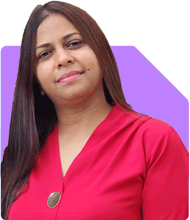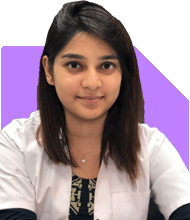Dr Karthiyayini Mahadevan | Answer |Ask -Follow
General Physician - Answered on Oct 24, 2023
She specialises in general medicine, child development and senior citizen care.
A graduate from Madurai Medical College, she has DNB training in paediatrics and a postgraduate degree in developmental neurology.
She has trained in Tai chi, eurythmy, Bothmer gymnastics, spacial dynamics and yoga.
She works with children with development difficulties at Sparrc Institute and is the head of wellness for senior citizens at Columbia Pacific Communities.... more

Vericose in my both legs. Can I get cured through homeopathy
Varicose vein happens due to long standing profession, weak calf muscles and non patent venous valves.
This needs lifestyle correction and stocking usage and toning up calf muscles in early stage
In advanced, this, needs surgical correction
You may like to see similar questions and answers below
Nidhi Gupta | Answer |Ask -Follow
Physiotherapist - Answered on Feb 24, 2023
Dr Karthiyayini Mahadevan | Answer |Ask -Follow
General Physician - Answered on Jul 02, 2023
Rebecca Pinto | Answer |Ask -Follow
Physiotherapist, Nutritionist - Answered on Feb 08, 2024
Dr Karthiyayini Mahadevan | Answer |Ask -Follow
General Physician - Answered on Oct 27, 2023
Dr Karthiyayini Mahadevan | Answer |Ask -Follow
General Physician - Answered on Jun 12, 2024
Ramalingam Kalirajan |10906 Answers |Ask -Follow
Mutual Funds, Financial Planning Expert - Answered on Dec 19, 2025
Nayagam P P |10859 Answers |Ask -Follow
Career Counsellor - Answered on Dec 19, 2025
Ramalingam Kalirajan |10906 Answers |Ask -Follow
Mutual Funds, Financial Planning Expert - Answered on Dec 19, 2025
Ramalingam Kalirajan |10906 Answers |Ask -Follow
Mutual Funds, Financial Planning Expert - Answered on Dec 19, 2025
Ramalingam Kalirajan |10906 Answers |Ask -Follow
Mutual Funds, Financial Planning Expert - Answered on Dec 19, 2025
Radheshyam Zanwar |6751 Answers |Ask -Follow
MHT-CET, IIT-JEE, NEET-UG Expert - Answered on Dec 19, 2025
Radheshyam Zanwar |6751 Answers |Ask -Follow
MHT-CET, IIT-JEE, NEET-UG Expert - Answered on Dec 19, 2025
Samraat Jadhav |2514 Answers |Ask -Follow
Stock Market Expert - Answered on Dec 18, 2025
Reetika Sharma |432 Answers |Ask -Follow
Financial Planner, MF and Insurance Expert - Answered on Dec 18, 2025
Reetika Sharma |432 Answers |Ask -Follow
Financial Planner, MF and Insurance Expert - Answered on Dec 18, 2025


























